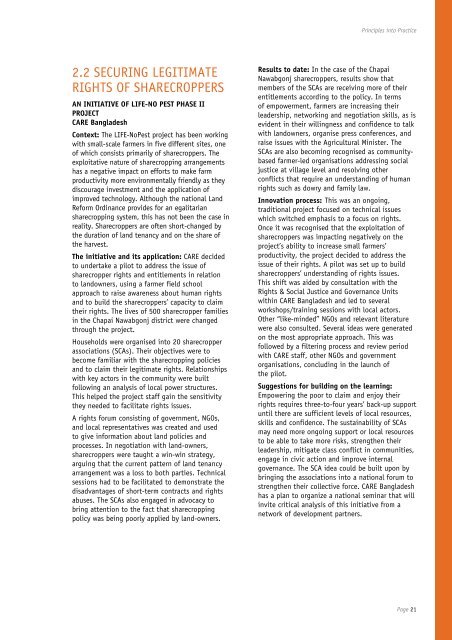Principles into Practice - Handicap International
Principles into Practice - Handicap International
Principles into Practice - Handicap International
- No tags were found...
You also want an ePaper? Increase the reach of your titles
YUMPU automatically turns print PDFs into web optimized ePapers that Google loves.
<strong>Principles</strong> <strong>into</strong> <strong>Practice</strong>2.2 SECURING LEGITIMATERIGHTS OF SHARECROPPERSAN INITIATIVE OF LIFE-NO PEST PHASE IIPROJECTCARE BangladeshContext: The LIFE-NoPest project has been workingwith small-scale farmers in five different sites, oneof which consists primarily of sharecroppers. Theexploitative nature of sharecropping arrangementshas a negative impact on efforts to make farmproductivity more environmentally friendly as theydiscourage investment and the application ofimproved technology. Although the national LandReform Ordinance provides for an egalitariansharecropping system, this has not been the case inreality. Sharecroppers are often short-changed bythe duration of land tenancy and on the share ofthe harvest.The initiative and its application: CARE decidedto undertake a pilot to address the issue ofsharecropper rights and entitlements in relationto landowners, using a farmer field schoolapproach to raise awareness about human rightsand to build the sharecroppers’ capacity to claimtheir rights. The lives of 500 sharecropper familiesin the Chapai Nawabgonj district were changedthrough the project.Households were organised <strong>into</strong> 20 sharecropperassociations (SCAs). Their objectives were tobecome familiar with the sharecropping policiesand to claim their legitimate rights. Relationshipswith key actors in the community were builtfollowing an analysis of local power structures.This helped the project staff gain the sensitivitythey needed to facilitate rights issues.A rights forum consisting of government, NGOs,and local representatives was created and usedto give information about land policies andprocesses. In negotiation with land-owners,sharecroppers were taught a win-win strategy,arguing that the current pattern of land tenancyarrangement was a loss to both parties. Technicalsessions had to be facilitated to demonstrate thedisadvantages of short-term contracts and rightsabuses. The SCAs also engaged in advocacy tobring attention to the fact that sharecroppingpolicy was being poorly applied by land-owners.Results to date: In the case of the ChapaiNawabgonj sharecroppers, results show thatmembers of the SCAs are receiving more of theirentitlements according to the policy. In termsof empowerment, farmers are increasing theirleadership, networking and negotiation skills, as isevident in their willingness and confidence to talkwith landowners, organise press conferences, andraise issues with the Agricultural Minister. TheSCAs are also becoming recognised as communitybasedfarmer-led organisations addressing socialjustice at village level and resolving otherconflicts that require an understanding of humanrights such as dowry and family law.Innovation process: This was an ongoing,traditional project focused on technical issueswhich switched emphasis to a focus on rights.Once it was recognised that the exploitation ofsharecroppers was impacting negatively on theproject’s ability to increase small farmers’productivity, the project decided to address theissue of their rights. A pilot was set up to buildsharecroppers’ understanding of rights issues.This shift was aided by consultation with theRights & Social Justice and Governance Unitswithin CARE Bangladesh and led to severalworkshops/training sessions with local actors.Other “like-minded” NGOs and relevant literaturewere also consulted. Several ideas were generatedon the most appropriate approach. This wasfollowed by a filtering process and review periodwith CARE staff, other NGOs and governmentorganisations, concluding in the launch ofthe pilot.Suggestions for building on the learning:Empowering the poor to claim and enjoy theirrights requires three-to-four years’ back-up supportuntil there are sufficient levels of local resources,skills and confidence. The sustainability of SCAsmay need more ongoing support or local resourcesto be able to take more risks, strengthen theirleadership, mitigate class conflict in communities,engage in civic action and improve internalgovernance. The SCA idea could be built upon bybringing the associations <strong>into</strong> a national forum tostrengthen their collective force. CARE Bangladeshhas a plan to organize a national seminar that willinvite critical analysis of this initiative from anetwork of development partners.Page 21

















